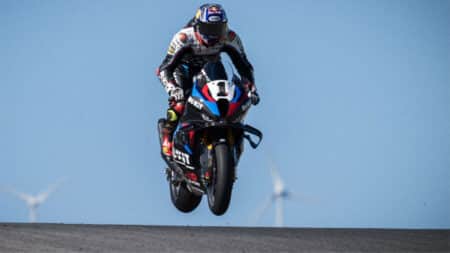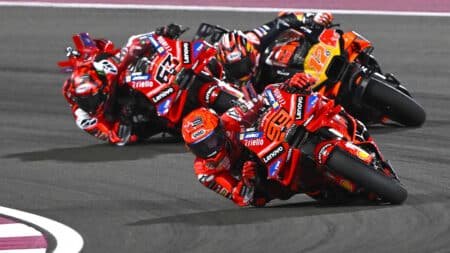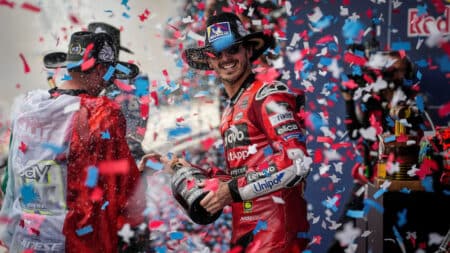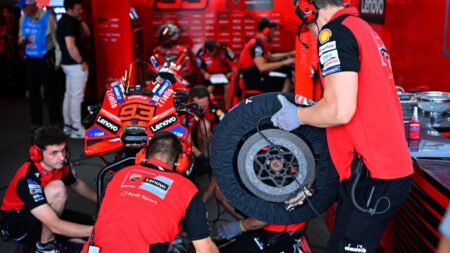
Honda gets serious: Toprak and Acosta in its MotoGP sights
Honda’s MotoGP project currently has huge momentum, which is why it’s jumping early into the 2026/2027 rider market, chasing Toprak Razgatlıoğlu and Pedro Acosta
KTM’s star signing definitely turned a corner at Sepang
All images: Mat Oxley
The 2019 season is KTM’s third in MotoGP and the next stage in the Austrian company’s long-term plan to conquer motorcycling’s highest peak.
One of KTM’s biggest investments to take its RC16 to the next level is two-time Moto2 world champion Johann Zarco, who occasionally dazzled on his independent-team Yamaha during 2017 and 2018, but did anything but sparkle during his first rides with KTM last November.
The RC16 is 180 degrees different to the YZR-M1 which Zarco loved so much – the Frenchman likes to use a smooth, gliding technique, while the RC16 is more of a point-and-shoot missile.
However, Zarco definitely made a breakthrough during the three days of testing at Sepang. His best lap time wasn’t anything to shout about but he was a fraction faster than Red Bull team-mate Pol Espargaró and more importantly he found a direction with his crew.
While KTM had Espargaró and test-rider Mika Kallio testing a mountain of new parts – different engine configurations, frames, swingarms, aerodynamics, shocks, forks and so on – they left Zarco to find out how the KTM works and how he needs to adapt his technique.
“Johann needs to adapt to the bike and he needs to understand how the bike reacts to different set-ups,” said KTM team boss Mike Leitner.
“During his first test at Valencia he couldn’t understand the bike, at the next tests at Jerez he was better and here he has made a really big step. All the time he is doing things like changing the geometry to understand how the bike react to changes. He knew how his previous bike reacted to changes, so now he has to build up his feeling with his new bike.
“Our approach is from both sides – we try to set up the bike in way he likes to ride, but he also needs to understand how he needs to adjust his style. Going from an inline-four to a V4 is a very different feeling.”
Zarco’s biggest problem when he first rode the KTM was getting into corners – he crashed twice at Valencia – but at Sepang he overcame that problem.
“We have worked a lot on getting confidence in corner entry, so I could relax more,” said Zarco. “Now I have an easy feeling into corners, with good control.”
More
The sweltering heat at Sepang – with track temperatures exceeding 60deg C in the middle of the day – was certainly a help for Zarco. A hot track generates so much heat in the tyres that they slide more easily and more crucially with more control. A tyre smears across a hot track before losing grip, giving the rider the chance to save the day, whereas on a cold track a tyre loses grip suddenly.
“The front feeling is better in hot conditions, so you can try things and not crash, which helps you understand the bike’s weak points and strong points. Now that I have a more natural feeling in corner entry I can focus on other parts of the corner and make another step. Now it’s the middle and the exit where I lose the most.
“I did try a new fairing which gives me a better feeling at the front on corner exits, so I have the right feeling to pick up the bike, use more power, find some stability and go.”
Although Zarco’s Sepang lap times weren’t lightning fast, they were, crucially, quick enough for him to follow the fastest riders, at least briefly. “That way I can analyse their strong points and understand where I’m struggling.”
Meanwhile Espargaró found himself increasingly confused during the early stages of the test.
“Every three laps we stop and try another new part – I’ve done so many laps like this that I sometimes lose my way and get confused,” said the Spaniard. “I also had a crash, because when you have something new to try you must push hard, so you need to take risks and sometimes you crash.”
Espargaró had test rider Mika Kallio sharing the testing load but not Dani Pedrosa, who was undergoing surgery in Barcelona to address the non-union of an old collarbone fracture. Surgeons used stem cells and osteosynthesis material in the procedure. Pedrosa hopes to be able to ride again in three months. During the Sepang tests he had daily phone calls with Leitner.
“We are missing Dani,” added Espargaró. “For sure he could bring fresh things from Honda that we are missing or are looking for in the wrong place.”
The GSX-RR and Álex Rins are quietly getting faster and faster
Ducati, Honda and Yamaha have won 36 of the last 42 MotoGP races, so their dominance of the premier class would seem complete. But there is one factory that’s been quietly getting closer and closer to threatening the hegemony of MotoGP’s triumvirate.
Suzuki spent last season chipping away, tenth by tenth, hundredth by hundredth, until victory was in its grasp. Many paddock people thought Andrea Iannone would’ve won Phillip Island if the race hadn’t gone awry for him.
And now it’s Suzuki’s current number-one rider Álex Rins who knows that the top step of the podium is finally within reach. The young Spaniard has to be the stealthiest on the grid: quiet and unassuming when he’s off the bike and so smooth that he looks slow when he’s on the bike.
At the end of the Sepang tests Andrea Dovizioso was impressed by two riders – Maverick Viñales and Rins, who seemed to have run the best race simulations.
Suzuki hasn’t changed its motorcycle drastically for 2019 – if it ain’t broke, don’t fix it – but Rins had plenty to test, including two engine specs and two minor chassis evolutions; even though the GSX-RR is almost certainly the best handling bike on the grid with excellent corner entry, corner speed, turning and good traction.
“For sure we don’t need to try anything crazy, like putting the rear wheel in the front,” said Rins. “This bike gives me the confidence to enter corners fast and use a lot of corner speed, so we just need to small adjustments that will give us more information and more consistency.”
In fact Rins had stunning consistency in his race simulation. “We did a 20-lap run with race tyres and the rhythm was incredible,” said Rins. “We tried a new fairing here which gave us some more tenths – it gives less wheelie and makes us faster on the straights. We also have a little more power. The only thing I really want to improve is stability on brakes
Joan Mir also worked well, ending the test three tenths behind his team-mate. “Mir is very good,” said Suzuki technical manager Ken Kawauchi. “He likes riding so much and he is very keen to learn.”

Honda’s MotoGP project currently has huge momentum, which is why it’s jumping early into the 2026/2027 rider market, chasing Toprak Razgatlıoğlu and Pedro Acosta

Marc Márquez was on another level at Losail, while Viñales magicked amazing speed out of nowhere in the 2025 MotoGP Qatar GP, Honda made another step and Martin put himself back in hospital

Bagnaia won his first race of 2025 at COTA but he’s still 5-1 down to his team-mate Marc Márquez, so how will their duel go this weekend in Qatar, which is supposed to better suit Bagnaia’s riding style?

Motorcycle racing is a nasty business, which is why many greatest racers indulge in questionable tactics. Following Marc Márquez’s COTA stunt, here are a few dodgy tales about former MotoGP kings Barry Sheene, Eddie Lawson and Phil Read